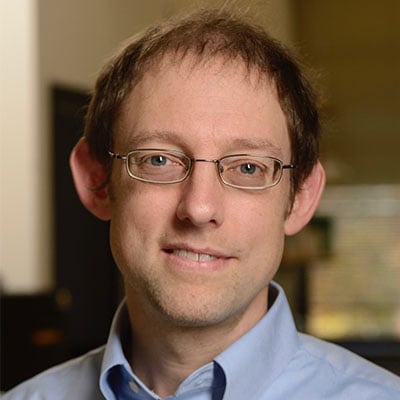
Joel Bader
Joel S. Bader, Ph.D., professor in the Department of Biomedical Engineering, uses engineering-based mathematical, computational, and high-throughput methods to study biomedical systems. Bader is Interim Director of the High-Throughput Biology Center at the School of Medicine, has a secondary appointment in the Department of Computer Science, and is a member of the Institute of Computational Medicine (School of Engineering) and the Institute of Genetic Medicine (School of Medicine).
Bader develops new computational methods to define how inborn genetic variants and acquired mutations lead to disease, primarily complex genetic disorders and cancer, with the goal of identifying new therapeutic targets. He also leads synthetic biology projects that design and build entire chromosomes and genomes to create new forms of life. He also leads an effort to create cells that rely on RNA (ribonucleic acid) rather than DNA for their genetic information. In related efforts, Bader’s lab develops technologies for biosafety and biosecurity, preventing escape of engineered life and identifying evidence of genetic engineering in DNA samples.
Bader serves as Interim Director of the High-Throughput Biology Center (HiT Center) at the Johns Hopkins University School of Medicine. He leads the Johns Hopkins Cancer Target Discovery and Development (CTD2) Center, which was funded by the National Cancer Institute to identify new targets for metastatic breast cancer by revealing the molecular drivers of tumor metastasis, the main cause of breast cancer mortality.
Bader, who holds a secondary appointment in the Department of Computer Science, is a member of the Whiting School of Engineering’s Institute of Computational Medicine and the Johns Hopkins School of Medicine’s Institute of Genetic Medicine. He is a founder of Neochromosome, Inc., a company using synthetic biology to develop new products for biomedicine and agriculture. Prior to joining the JHU faculty in 2003, Bader worked in biotech at CuraGen Corporation as director of bioinformatics. At CuraGen Corporation, he co-invented the 454 Genome Sequencer, the first next-generation DNA sequencer to reach the market.
Bader received a National Science Foundation (NSF) CAREER Award. He is a Fellow of the American Institute for Medical and Biological Engineering (AIMBE) and Deputy Editor of PLOS Computational Biology. He regularly serves on federal government advisory committees for the National Institutes of Health, the NSF, and the Department of Energy.
Bader received a B.S. in Biochemistry from Lehigh University, where he was elected to Phi Beta Kappa and Tau Beta Pi, and a Ph.D. in Chemistry from the University of California, Berkeley, where he was an NSF Pre-Doctoral Fellow. He did postdoctoral research at Columbia University. He joined the faculty of the Whiting School of Engineering as an assistant professor in 2003, which has been his academic home ever after.


